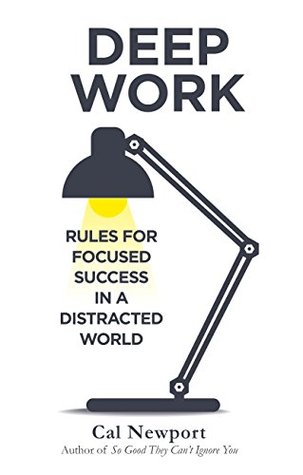
Deep work implies professional activities performed in a state of total concentration devoid of any form of distraction whatsoever. These efforts improve skills, enhance mastery and create new values.
Although hard to replicate, it has been proven scientifically and psychologically that the state of mental strain accompanying deep work is essential to improve one’s ability.
This self-help book is written by Carl Newport, a college professor, and an established author. He pointed out the various advantages of mastering the art of deep work, effective ways of mastering it, and various examples of people, research, and scientific-based experiments to support his claim.
He argued that “the ability to perform deep work is becoming increasingly rare at exactly the same time it is becoming increasingly valuable in our economy. As a consequence, the few who cultivate the skill, and then make it the core of their working life will thrive”.
The book is divided into two parts. The first discussed the ‘idea’ behind the concept of deep work and the second talked about the ‘rules’ guiding the effective cultivation and application of the art of deep work.
THE IDEA
The first chapter of the first part explains the value of deep work. According to Newport, in this new economy, those with advantages are those who either can work well and creatively with intelligent machines, those who are the best at what they do, and those with access to capital.
Therefore, to be a winner in this new economy, you must be able to master hard things and also be able to do it speedily and consistently. If you don’t learn, you can’t produce and if you can’t produce, you can’t earn- no matter your level of talent or skills.
Hence, deep work is the art required in the science of learning, and concentration is required to be productive at such an elite level.
The second chapter of this same part talks about the fact that deep work is rare these days.
The invention of instant messaging apps and a surge in the use of social media apps have limited the attention span of the majority. There is also now an increase in the way people are being kept busy (with responding to e-mails, attending to some shallow work, and so on) which has overall made people less effective and productive.
Newport then remarked that as much as this is bad for business, it is an advantage to whosoever prioritizes deep work.
The third chapter reiterates that deep work is meaningful. Here, three arguments for depth were propounded. They are neurological, psychological, and philosophical arguments.
THE RULES
The second part discussed the rules which the author suggests could encourage and make one develop the art of working deeply.
These rules are:
Work deeply
Embrace boredom
Quit social media
Drain the shallows
The first rule which talks about working deeply encourages readers to decide on their depth philosophy. The monastic, bimodal, rhythmic, and journalistic philosophies were all the different philosophies proposed by the author. Readers are then encouraged to work ‘ritually’ with a philosophy that works best with their kind of profession and that which will yield maximum output in their careers. The ways by which deep work can be inculcated were also well explained in this chapter.
In the second rule which talks about embracing boredom, the author pointed out that getting creative insights which is a consequence of working deeply have little to do with a one-time decision to think deeper, and much more to do with a commitment to training this ability every day.
Newport suggests that moments of potential boredom should not always be avoided. The ability to stay without being distracted or always looking for the next available means of getting fun enables the brain to develop itself into deep work. The way acts of consistent productive meditation, structured thinking, and how constant avoidance of breaks help to increase cognitive ability were also discussed here.
The author argued in the third rule which states- quit social media that “you’re justified in using a network tool if you can identify any possible benefit to its use, or anything you might probably miss out from if you don’t use it”.
Furthermore, the writer suggested that the use of social media should be avoided as much as possible because they overall have a negative impact on productivity and the ability to be focused. He otherwise suggested that social media breaks should be taken and there should be strict scheduling of our time in a way that the usage of the instant messaging and social media apps are restricted only to a particular time.
Summarily, the author argued that rather than depend on the internet, social media, and entertainment apps for entertainment, quality alternatives should be given to the brain as this will preserve its ability to resist distraction and concentrate.
The final rule which says ‘drain the shallows’ talks about how shallow works which require less degree of concentration and professionalism should be avoided as much as possible. Especially in periods when deep work is much more required.
In conclusion, Newport used the example of Bill Gates to drive home his point. He explained that Gate’s devotion to work extensively without allowing for any form of distraction (either of acts or of the mind) allowed him developed the programming language that set him on the pedestal which transformed him to be one of the richest and most powerful beings on earth.



Leave a Reply